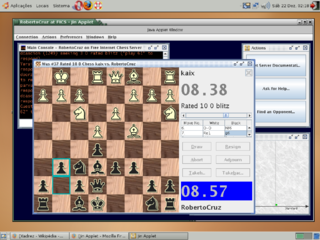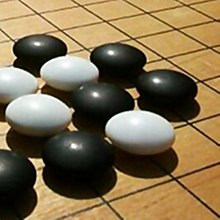A massively multiplayer online role-playing game (MMORPG) is a video game that combines aspects of a role-playing video game and a massively multiplayer online game.

Go is an abstract strategy board game for two players in which the aim is to surround more territory than the opponent. The game was invented in China more than 2,500 years ago and is believed to be the oldest board game continuously played to the present day. A 2016 survey by the International Go Federation's 75 member nations found that there are over 46 million people worldwide who know how to play Go and over 20 million current players, the majority of whom live in East Asia.
Dynamic DNS (DDNS) is a method of automatically updating a name server in the Domain Name System (DNS), often in real time, with the active DDNS configuration of its configured hostnames, addresses or other information.

Computer Go is the field of artificial intelligence (AI) dedicated to creating a computer program that plays the traditional board game Go. The field is sharply divided into two eras. Before 2015, the programs of the era were weak. The best efforts of the 1980s and 1990s produced only AIs that could be defeated by beginners, and AIs of the early 2000s were intermediate level at best. Professionals could defeat these programs even given handicaps of 10+ stones in favor of the AI. Many of the algorithms such as alpha-beta minimax that performed well as AIs for checkers and chess fell apart on Go's 19x19 board, as there were too many branching possibilities to consider. Creation of a human professional quality program with the techniques and hardware of the time was out of reach. Some AI researchers speculated that the problem was unsolvable without creation of human-like AI.

The Free Internet Chess Server (FICS) is a volunteer-run Internet chess server. It was organised as a free alternative to the Internet Chess Club (ICC), after that site began charging for membership.
ChessBase is a German company that develops and sells chess software, maintains a chess news site, and operates an internet chess server for online chess. Founded in 1986, it maintains and sells large-scale databases containing the moves of recorded chess games. The databases contain data from prior games and provide engine analyses of games, while endgame tablebases offer optimal play in some endgames.
A multiplayer video game is a video game in which more than one person can play in the same game environment at the same time, either locally on the same computing system, on different computing systems via a local area network, or via a wide area network, most commonly the Internet. Multiplayer games usually require players to share a single game system or use networking technology to play together over a greater distance; players may compete against one or more human contestants, work cooperatively with a human partner to achieve a common goal, or supervise other players' activity. Due to multiplayer games allowing players to interact with other individuals, they provide an element of social communication absent from single-player games.

Furcadia is a free-to-play MMOSG/MMORPG or graphical MUD, set in a fantasy world inhabited by magical creatures. The game is based on user-created content with emphasis on world building tools, exploring, socializing, and free-form roleplaying. Furcadia hosts a large volunteer program called the Beekin Helpers, allowing players to help with community moderation, welcoming new players, handling in-game technical support, running in game events, creating art for the game itself, accessing and updating the game's website, and bug hunting. Furcadia holds the Guinness World Records title for the longest continuously running social MMORPG and in addition to being one of the first games to heavily encourage modding and let users build virtual worlds for themselves, it was also one of the first freemium online games. In 2008, Furcadia was reported as having over 60,000 players.

PunkBuster is a computer program that is designed to detect software used for cheating in online games. It does this by scanning the memory contents of the local machine. A computer identified as using cheats may be banned from connecting to protected servers. The aim of the program is to isolate cheaters and prevent them from disrupting legitimate games. PunkBuster is developed and published by Even Balance, Inc.

Cheating in online games is the subversion of the rules or mechanics of online video games to gain an unfair advantage over other players, generally with the use of third-party software. What constitutes cheating is dependent on the game in question, its rules, and consensus opinion as to whether a particular activity is considered to be cheating.

There are various systems of Go ranks and ratings that measure the skill in the traditional board game Go. Traditionally, Go rankings have been measured using a system of dan and kyu ranks. Especially in amateur play, these ranks facilitate the handicapping system, with a difference of one rank roughly corresponding to one free move at the beginning of the game. This system is also commonly used in many East Asian martial arts, where it often corresponds with a belt color. With the ready availability of calculators and computers, rating systems have been introduced. In such systems, a rating is rigorously calculated on the basis of game results.
An online text-based role playing game is a role-playing game played online using a solely text-based interface. Online text-based role playing games date to 1978, with the creation of MUD1, which began the MUD heritage that culminates in today's MMORPGs. Some online-text based role playing games are video games, but some are organized and played entirely by humans through text-based communication. Over the years, games have used TELNET, internet forums, IRC, email and social networking websites as their media.
In the game of Go, the empty triangle is the most fundamental example of the concept of bad shape.
An Internet chess server (ICS) is an external server that provides the facility to play, discuss, and view the board game of chess over the Internet. The term specifically refers to facilities for connecting players through a variety of graphical chess clients located on each user's computer.
In computing, logging is the act of keeping a log of events that occur in a computer system, such as problems, errors or just information on current operations. These events may occur in the operating system or in other software. A message or log entry is recorded for each such event. These log messages can then be used to monitor and understand the operation of the system, to debug problems, or during an audit. Logging is particularly important in multi-user software, to have a central overview of the operation of the system.

GB-PVR was a PVR application, running on Microsoft Windows, whose main function was scheduling TV recordings and playing back live TV. GB-PVR is no longer under active development and has been superseded by NextPVR, also known as nPVR.
The KGS Go Server, known until 2006 as the Kiseido Go Server, is a game server first developed in 1999 and established in 2000 for people to play Go. The system was developed by William M. Shubert and its code is now written entirely in Java. In Spring of 2017, Shubert transferred ownership to the American Go Foundation.

An Internet Go server is a server that allows players of the game of Go to play against opponents online. The two fundamental types of Go server are real-time servers and turn-based servers.
Pandanet, located in Tokyo, Japan, is a server that allows players of the game of Go to observe and play against others over the Internet. Started February 2, 1992, by Tim Casey, Chris Chisolm, and Mark Okada, working out of the University of New Mexico, and until April 5, 1993, continued at the University of California, Berkeley, and UC San Francisco, it was the first server of its kind. After its initial inception some of its members helped to improve the server by writing software with a graphical interface; and thus IGS was born. Pandanet hosts up to 3,000 players at a time, depending on the time of day. Its PC client's name is GoPanda.







